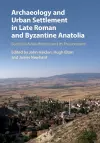
Archaeology and Urban Settlement in Late Roman and Byzantine Anatolia
3 contributors - Hardback
£105.00
John Haldon is Shelby Cullom Davis '30 Professor of European History and Professor of Byzantine History and Hellenic Studies at Princeton University, New Jersey, and the overall director of the Avkat Archaeological Project. His research focuses on the social-economic, institutional and cultural history of the medieval Eastern Roman Empire in the seventh to twelfth centuries; on state systems across the Eurasian world from late ancient to early modern times; on environmental stress and societal resilience in pre-modern societies; and on the production, distribution and consumption of resources in the late ancient and medieval world. He is the author of many articles, monographs and edited volumes, including, with Leslie Brubaker, Byzantium in the Iconoclast Era, c.680–850 (Cambridge, 2011) and The Empire that Would Not Die: The Paradox of Eastern Roman Survival, 640–740 (2016). Hugh Elton is a Professor in Ancient Greek and Roman Studies at Trent University, Peterborough, Ontario, and served as permit holder for the Avkat Archaeological Project. He has been Director of the British Institute at Ankara and also directed the Göksu Archaeological Project. His research focuses on the ways in which the Roman state worked in late antiquity. He has published numerous works examining the practicalities of ruling the Empire, the impact that the Roman state had on Anatolia, especially on rural areas, and the effectiveness of the Roman army, and his most recent book is The Roman Empire in Late Antiquity: A Political and Military History (Cambridge, forthcoming). James Newhard is a Professor of Classics at the College of Charleston and served as the Field Director for the Avkat Archaeological Project. His fieldwork experiences include excavations and survey projects in Turkey, Greece, Albania, and the United States. His research focuses on the development of geospatial methods within landscape archaeology; the emergence of complex state systems; archaeological informatics, and ancient economic processes.